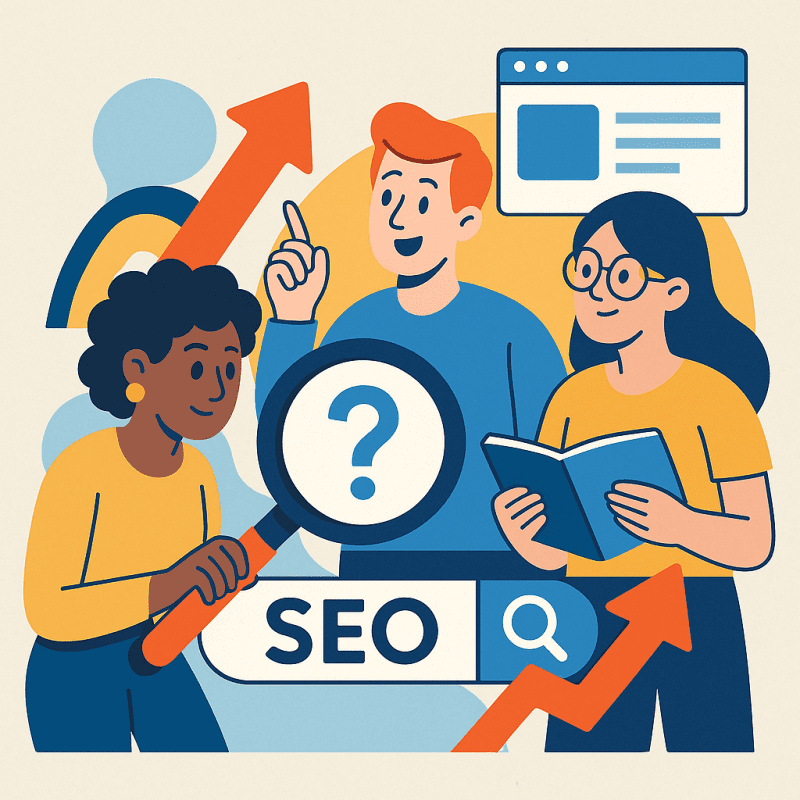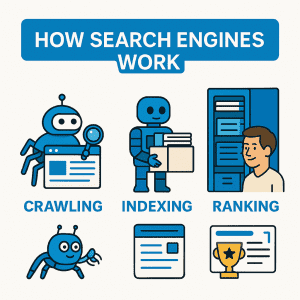SEO Guide for Small Businesses
Welcome to The SEO Guide Book – your friendly and practical introduction to the world of Search Engine Optimisation (SEO). If you’ve landed here, you’re probably wondering what SEO actually is, how it works, and whether it’s really something you need to worry about. Spoiler alert: it is.
But don’t worry – we’re not here to throw technical jargon at you or drown you in marketing speak. We’re here to explain SEO in plain English, so you can take control of your website, reach more customers, and grow your business with confidence.
Note: If you think you’re ready to skip SEO and jump straight into GEO (Generative Engine Optimisation)? Think again. Before you can master AI Search, you need to understand the foundations of SEO – because one doesn’t work without the other.

🔎 So, What is SEO?
SEO stands for Search Engine Optimisation. It’s the process of improving your website so it shows up more often – and higher – in search results on platforms like Google.
Let’s break it down:
When someone searches for something online (like “best coffee in Manchester” or “affordable web design for small business”), search engines scan millions of web pages to find the most relevant and useful answers. SEO is what helps your website become one of those answers.
In short, SEO is about making your site:
- Easier to find
- Easier to understand
- And more likely to rank well in search results
📈 Why SEO Matters for Your Business
You might be wondering, “Isn’t having a website enough?” The short answer: No.
Your website is only effective if people can find it. Without SEO, your site is like a brilliant shop tucked away down a quiet alley – full of potential, but invisible to passing traffic.
Here’s why SEO is essential:
- 🧭 Increased visibility – SEO helps your site appear in front of people already looking for what you offer.
- 💰 Cost-effective marketing – Unlike paid ads, SEO delivers long-term results without ongoing spend.
- 🤝 Builds trust and credibility – People trust search engines. If Google trusts you, users are more likely to trust you too.
- 📊 More traffic, more sales – Higher rankings mean more visitors, and more visitors mean more opportunities to convert.
- 🏆 Levels the playing field – Good SEO lets small businesses compete with much larger ones—without a huge budget.
🧱 The Core Elements of SEO
SEO can feel overwhelming at first, but it actually boils down to three main areas:
1️⃣ On-Page SEO
This refers to what happens on your actual website. It includes:
- Proper use of keywords
- Quality content that answers questions and is well-organised
- Clear structure with headings, subheadings, and internal links
- Page titles and meta descriptions
- Image optimisation and alt text
On-page SEO tells search engines: “Here’s what this page is about – and here’s why it’s useful.”
2️⃣ Off-Page SEO
This is all the activity that happens outside your website that still affects your rankings. Most of it comes down to:
- Backlinks (links from other reputable websites to yours)
- Brand mentions on social media or forums
- Guest blogging
- Online reviews
Off-page SEO builds authority. It’s like word-of-mouth for the internet.
3️⃣ Technical SEO
This focuses on the back-end setup of your site. Search engines prefer fast, secure, easy-to-navigate websites. Technical SEO includes:
- Site speed
- Mobile-friendliness
- Secure browsing (HTTPS)
- Clean code and structured data
- A clear sitemap and crawlability
🤖 How Do Search Engines Work?

Search engines like Google work in three key steps:
🕷️ 1. Crawling
Bots (also called spiders) scan your website to discover pages and content.
📦 2. Indexing
Once discovered, your pages are stored in Google’s massive index—essentially a giant digital library.
⚖️ 3. Ranking
When someone searches for something, Google ranks pages based on how well they match the searcher’s intent. This is where your SEO efforts pay off.
🧐 What Factors Influence Your Rankings?
Google’s algorithm is famously complex, but here are some of the key factors that affect your visibility:
- 🔑 Keyword relevance
- 📝 High-quality, original content
- 🔗 Backlinks from authoritative websites
- 📱 Mobile usability
- ⚡ Fast page load speeds
- 🧭 User-friendly structure
- 📊 Behavioural data (like time on site or bounce rate)
⚙️ Is SEO a One-Time Fix?
Unfortunately, no. SEO is not something you do once and forget. It’s an ongoing process, much like exercising or maintaining your car.
Why?
- Competitors are always updating their content
- Google updates its algorithm regularly
- Trends, products, and customer behaviour change over time
But here’s the good news: once you build a solid SEO foundation, the work gets easier – and the results compound over time.
💬 SEO Jargon Explained (Without the Headache)
| Term | What It Means |
|---|---|
| Keyword | A word or phrase someone types into Google |
| Ranking | Where your website appears in the search results |
| Backlink | A link from another website to yours |
| Meta Description | A short summary of a page shown in search results |
| Bounce Rate | The percentage of visitors who leave without clicking further |
| Alt Text | Descriptive text added to images for accessibility and SEO |
| SERP | Stands for Search Engine Results Page |
| CTR | Click-Through Rate – how many people click your result in the SERP |
Want to know more? Visit the SEO Glossary page.
✨ Final Thoughts: You Can Do SEO
SEO can seem mysterious, but it really boils down to helping both people and search-engine bots understand why your pages deserve a prime spot in the results. Search engines crawl, index and then rank content; your job is to make that process easy by offering clear answers, fast pages and a structure that’s simple to navigate.
Remember the three pillars covered above. On-page SEO is everything visitors see – compelling headings, well-chosen keywords and helpful images that load quickly. Off-page SEO is digital word-of-mouth: links, reviews and social mentions that tell Google you’re worth trusting. Technical SEO is the behind-the-scenes tune-up – speed, mobile usability and secure browsing – that keeps the whole engine humming.
Most importantly, SEO isn’t reserved for agencies or code wizards. With resources like The SEO Guide Book at your side, you can make gradual improvements, monitor the results and learn as you go. Be patient, stay curious and celebrate each climb in the rankings – you’re already on the path to sustainable, cost-effective growth.
🔁 Up Next!
Can I Do SEO Myself? – If you’ve ever wondered whether you can handle your own SEO without hiring an expensive agency or consultant, the answer is a firm yes.
📈 SEO Smarts: Test Your Knowledge!
Maybe you already understand the basics of SEO?
This quick multiple-choice quiz is designed to test your basic knowledge of Search Engine Optimisation. Whether you’re a total beginner or just brushing up on the essentials, “Ready, Set, SEO!” will challenge what you know (and reveal what you don’t).
No pressure – just 20 fun questions to help you learn, improve, and maybe even impress Google. 😉
🎯 Go to the Quiz
❓ Real SEO Questions Answered
What’s the easiest way to explain SEO to someone without a tech background?
Think of SEO like helping Google understand your website. Just like a librarian needs to know what a book is about to shelve it correctly, SEO helps your website show up when people search for things related to your content.
Is SEO something I can learn and do myself, or do I need an agency?
You can absolutely learn the basics and handle a lot of SEO yourself, especially using guides like this one. But for technical audits, large sites, or competitive industries, an experienced SEO agency can save you time and boost results.
How long does it actually take before SEO starts working?
In most cases, SEO results start to show in 3–6 months, but it depends on your competition, the quality of your content, and how consistent your efforts are. It’s a long game, but a powerful one.
What’s more important for SEO – content or backlinks?
Both matter. Quality content helps you rank in the first place, while backlinks help you stay there. Ideally, great content attracts natural backlinks, so they work hand-in-hand.
Do I need to blog regularly for my SEO to improve?
You don’t need to post every day, but regular, useful content shows search engines that your site is active and helpful. Focus on quality over quantity – one solid post a month beats five rushed ones.
How do I know if Google can see all my website pages?
You can use Google Search Console’s Coverage and URL Inspection tools to see what’s indexed. If pages aren’t appearing, it might be due to crawl issues, noindex tags, or weak internal linking.
What should I fix first if I want better SEO and I’m short on time?
Start with your page titles and meta descriptions, improve site speed, and make sure your site works well on mobile. These three things alone can make a noticeable difference.
Are keywords still important, or is SEO more about topics now?
Keywords are still important, but Google is smarter now – it looks at topics, meaning, and intent. Focus on answering real user questions and covering a topic thoroughly, not just repeating phrases.
Can I just install an SEO plugin and be done with it?
SEO plugins like Yoast or Rank Math help with the basics (titles, sitemaps, meta data), but they don’t write content, build links, or improve site speed for you. They’re tools, not magic buttons.
Why does my competitor rank above me even though their website looks worse?
Looks don’t always matter to Google. Your competitor might have stronger backlinks, better internal structure, or content that answers search intent more clearly. SEO is about relevance and trust, not just good design.
Video Recap – 🔍 What Is SEO? (Search Engine Optimisation Explained Simply)
You’ve heard of SEO – but what does it actually mean? Let’s break it down in plain English, once and for all.


